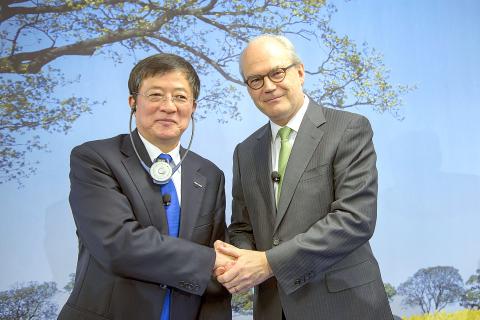The European Commission on Friday opened an in-depth investigation into state-owned China National Chemical Corp’s (ChemChina, 中國化工) 40 billion euro (US$43.94 billion) takeover of Swiss seeds giant Syngenta AG to see if it would hurt competition.
“We need to carefully assess whether the proposed merger would lead to higher prices or a reduced choice for farmers,” EU Competition Commissioner Magrethe Vestager said in a statement.
The deal — the biggest in a series of Chinese overseas acquisitions — would combine Syngenta, a global leader in seeds and crop protection with ChemChina which controls Adama Holding Ltd, the largest supplier of generic crop protection products in Europe.

Photo: AP
“The transaction would take place in an industry that is already relatively concentrated,” the commission said.
In a joint statement, ChemChina and Syngenta said they would “continue constructive discussions with the EU authorities in order to conclude the review as early as possible.”
The commission probe is to run through March 15 next year.
Syngenta said it was confident the deal would go through, having already been cleared in the US and Japan.
The commission said initial investigations showed the new company would have “relatively high combined market shares” in several categories, while ChemChina’s Adama would be removed as a competitor with Syngenta.
Given the global scope of Syngenta and ChemChina, the commission said it would cooperate closely with other competition authorities, notably in the US, Brazil and Canada.
The deal is just one of several huge takeovers in the agrochemical sector, with German giant Bayer AG offering US$66 billion for US firm Monsanto Co, which last year had tried to acquire Syngenta for SU$46 billion.
The commission reiterated that it also has an in-depth probe underway into a proposed tie-up between US chemical giants Dow Chemical Co and DuPont Co valued at US$130 billion, with a decision due on Feb. 6 next year.
If the commission finds fault with a proposed merger, it can reject the deal but more usually it asks the companies to sell parts of the business, or to allow in newcomers so as to minimize the impact on customer choice and price.
Earlier this month, Beijing announced plans to merge ChemChina with Sinochem Corp (中國中化) as part of efforts to reshape China’s — and so the world’s — chemicals industry.
STILL SHORT
It was not immediately clear how this might affect the Syngenta deal, while reports in Beijing-based financial news magazine Caixin said that ChemChina was still short US$15 billion to fund the acquisition.

Merida Industry Co (美利達) has seen signs of recovery in the US and European markets this year, as customers are gradually depleting their inventories, the bicycle maker told shareholders yesterday. Given robust growth in new orders at its Taiwanese factory, coupled with its subsidiaries’ improving performance, Merida said it remains confident about the bicycle market’s prospects and expects steady growth in its core business this year. CAUTION ON CHINA However, the company must handle the Chinese market with great caution, as sales of road bikes there have declined significantly, affecting its revenue and profitability, Merida said in a statement, adding that it would

RISING: Strong exports, and life insurance companies’ efforts to manage currency risks indicates the NT dollar would eventually pass the 29 level, an expert said The New Taiwan dollar yesterday rallied to its strongest in three years amid inflows to the nation’s stock market and broad-based weakness in the US dollar. Exporter sales of the US currency and a repatriation of funds from local asset managers also played a role, said two traders, who asked not to be identified as they were not authorized to speak publicly. State-owned banks were seen buying the greenback yesterday, but only at a moderate scale, the traders said. The local currency gained 0.77 percent, outperforming almost all of its Asian peers, to close at NT$29.165 per US dollar in Taipei trading yesterday. The

RECORD LOW: Global firms’ increased inventories, tariff disputes not yet impacting Taiwan and new graduates not yet entering the market contributed to the decrease Taiwan’s unemployment rate last month dropped to 3.3 percent, the lowest for the month in 25 years, as strong exports and resilient domestic demand boosted hiring across various sectors, the Directorate-General of Budget, Accounting and Statistics (DGBAS) said yesterday. After seasonal adjustments, the jobless rate eased to 3.34 percent, the best performance in 24 years, suggesting a stable labor market, although a mild increase is expected with the graduation season from this month through August, the statistics agency said. “Potential shocks from tariff disputes between the US and China have yet to affect Taiwan’s job market,” Census Department Deputy Director Tan Wen-ling

UNCERTAINTIES: The world’s biggest chip packager and tester is closely monitoring the US’ tariff policy before making any capacity adjustments, a company official said ASE Technology Holding Inc (日月光投控), the world’s biggest chip packager and tester, yesterday said it is cautiously evaluating new advanced packaging capacity expansion in the US in response to customers’ requests amid uncertainties about the US’ tariff policy. Compared with its semiconductor peers, ASE has been relatively prudent about building new capacity in the US. However, the company is adjusting its global manufacturing footprint expansion after US President Donald Trump announced “reciprocal” tariffs in April, and new import duties targeting semiconductors and other items that are vital to national security. ASE subsidiary Siliconware Precision Industries Co (SPIL, 矽品精密) is participating in Nvidia